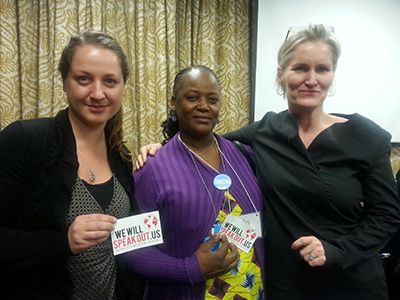The Untapped Potential of the Faith Community to End Violence Against Women and Girls

By Vanessa Pizer
Well-meaning people and communities of all faiths have in the past colluded in sexual violence and violence against women and girls, whether through silence, denial or negligence. Despite this, for many victims of violence, faith remains a pillar of strength and hope in the face of sexual, physical, psychological and financial abuse. Therefore, religious institutions have a responsibility to not only acknowledge the problem and their role in it, but to also serve as agents of support and change.
This was the overall sentiment of the recent multi-faith panel discussion entitled “Engaging the Faith Community to Address Sexual and Gender-Based Violence (SGBV),” held last week as part of the 58th Session of the United Nations Commission on the Status of Women. This standing-room only event brought together clergy, scholars and activists from Christian, Jewish and Islamic organizations, which provide services for those affected by violence.
These organizations, in addition to a growing number of other faith-based and secular organizations throughout the world, are advocating for religious leaders and groups to step up and work towards changing the attitudes and behaviors that lead to violence. The panel highlighted the need for people within the faith to reinterpret and transform traditional theologies of domination and submissiveness.

Faith leaders and groups throughout the world need to leverage their strengths: Leadership (wisdom and charisma in the pulpit and the pew), Presence (in conflict zones and the world’s most underserved and hardest-to- reach places) and Teachings (scripture that promotes love, equality and empowerment). Their power to shape global consciousness, especially when they collaborate with policy makers, local government, social service providers, youth coalitions and other community groups, is inspiring and without boundaries.
Episcopal Relief & Development is a founding member of WeWillSpeakOut.US, the U.S.-based arm of a global coalition of religious organizations and faith-based NGOs, which are collaborating to end violence against women and girls globally. We are encouraging our partner organizations around the world to carefully document sexual violence and violence against women and girls in their communities and the resources they have to combat it in order to develop integrated initiatives that result in measurable impacts in the lives of people affected by violence.

We recognize that successful violence against women and girls programs require both prevention and response components. Prevention includes raising awareness and promoting positive male roles by engaging men and boys in changing behaviors and attitudes that contribute to violent practices. Services for those affected by violence focuses on creating or strengthening integrated referral networks that provide physical safety, medical care, economic opportunities, legal assistance and pastoral care; all done in partnership with other organizations and faith communities.
While much remains to be done in transforming the faith community’s role in violence against women and girls prevention and response, the honest discussions taking place among religious leaders and groups and the programs offered by faith-based organizations, are a meaningful start.
We invite you to participate in any way you can. A simple start is by signing the pledge at the We Will Speak Out website. You can also arrange to have your congregation prepare for We Will Speak Out Sunday. More information can be explored here: http://wewillspeakout.us/speakoutsunday/
—————————–

Vanessa Pizer recently joined our International Development team as a Program Officer. She will be managing a portfolio of integrated partner programs and helping to develop programming for violence against women and girls.
Photos:
Top; View of the room just before the panel discussion got started; Middle, panelist from the event (credit-Islamic Relief USA); Bottom, Vanessa Pizer, Program Manager, Episcopal Relief & Development, Godet Mugisa Isingoma, Partner Representative from the DR Congo; Kirsten Muth, Senior Director of International Programs, Episcopal Relief & Development.


